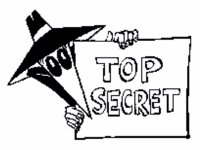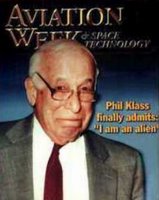
The recent column about
Phil Klass's FBI files has prompted me to give some thought to the concept of "disinformation" in general. It is perhaps the most overused term in the ufological lexicon - a stock, catch-all excuse to employ whenever one needs to explain why the facts don't fit a particular interpretation of them ("oh, it must be disinformation").
Which is not to say that governments do not employ disinformation from time to time, for a host of reasons, many of which have nothing to do with the subject of the disinformation itself. Call it the old bait and switch. It is a technique neo-Nazis used to use - they would pretend to be interested in UFOs in order to lure in impressionable young people. Things would then graduate to conspiracy theories, and the next thing you know, they would have some converts to the neo-Nazi cause. It had nothing to do with UFOs - their efforts were designed to achieve another aim.
So, if the government is engaged in UFO-related disinformation, the question is "to what end?" Is it being used to cover up a vast Cosmic Watergate?
Maybe (more on this below). However, with most of it, particularly during the Cold War years, I suspect their motives were, and remain today, more... earthly.
Such as?
Well, here's a hypothetical:
The United States military has a vested interest in promoting the Ballistic Missile Defence project. The flip-side of that is that it may well have an interest in undermining and discrediting those people and groups which are opposed to BMD.
If I was someone tasked with that job, how would I go about it?
First, one must always be aware that the easiest way to discredit someone is to link them with someone - or something - that is not particularly credible. There are many suspects. After all, disinformation can run in many different directions at the same time, all designed to achieve the same aim. You would certainly want to link them with the far left as much as possible, for example (given this particular context - in other cases you might actually want to link people to the far right). If you could tie them with Chavez's Venezuela, or maybe China, or Cuba, so much the better.
On a smaller scale, however, would be other targets - one of which could well be UFOs.
How? Why?
A good way to start would be to try and link the peace movement, and the anti-BMD movement in particular, with some sort of UFO cause (why UFOs and BMD? Because both are understood as relating to "space.") Not the serious UFO stuff, mind you (no mention of the Sturrock Panel, or someone like Dr. Jacques Vallee or Dick Hall); rather, the wacky stuff - you know, about establishing diplomatic relations with myriad alien races who are in cahoots with the government and are helping us reverse engineer advanced technology and/or to fight the "evil alien races" with exotic super-BMD space weapons ... etc, etc, blah blah blah, ad infinitum.
In other words, the stuff that the sensible ufologists think is, to be polite, a bit "out there".
In the 1950s, the contactee movement would have been a good bet for this kind of thing.
Today?
Exopolitics.
Imagine putting forth people who will, in the same interview, talk about aliens being in cahoots with the government, the threat of an intergalactic war (whatever happened to a good old "intragalatic war"?), and... by the way... BMD, which is of course aimed at the aliens, and which is bad.
Very bad.
Aliens linked to anti-BMD. Chuckles galore on the evening news. The anti-BMD movement discredited, if ever so slightly (remember, these things can be a cumulative effort, so every little bit helps), in the eyes of those watching at home, or surfing the Internet.
Gold. Job well done. Give that disinfo guy a raise.
Now, does this mean that exopolitics is actually part of some disinformation scheme, or that, even if it is, all of the people involved in it in some way or another are part of a disinformation scheme?
Of course not. If it was part of a disinformation scheme, it would be a few people, not many. The rest, like all of the dupes that the Soviets hooked in the 1930s and 1940s, would be just that - well-meaning dupes.
Still, who knows? But someone has just started a blog to "expose UFO disinformation", and listed Drexel University student newspaper columnist Aaron Sakulich (Aaron Sakulich!!) as the first target (although not in a "he's a government agent" context... yet). The fringier ufologists make a habit out of saying that this skeptic is a disinfo specialist, or that one is - or that everything is disinformation. And that doesn't even begin to take into account the ravings of someone like William Cooper, i.e. the "fringe" of the "fringe", who thought that pretty much everyone in ufology was working for "them". It's almost as if they can't think of anything more intelligent to say. They bandy the term "disinformation" about without really knowing what it means, or how it works.
Why? Because the facts don't always fit the paradigm they have adopted, or because someone like Sakulich, or Klass, or Kevin Randle (yes, he's been a target as well) says something they don't like, or agree with.
None of that makes much sense (frankly, a guy like Klass, clumsy to the core, would be the last guy you would pick, unless you wanted to discredit CSICOP for some reason). What
does make sense, if you're a believer in disinformation, is using the "aliens are on Earth" stuff to discredit something like the anti-BMD movement, or the peace movement. There would be a logical reason for it - at least it would be logical to the people running any such scheme. By associating anti-BMD activists with aliens and space wars one makes the very concept of opposition to BMD seem like looney tunes. BMD would seem like scientific reality. Anti-BMD is made to look like science fiction.
Of course, there's another possibility, too - that the government (or part of it) may also be trying to discredit the serious study of the UFO phenomenon, and to undermine in particular any attempt to hold hearings at a government level, i.e. Congress, or the House of Commons, on the subject of UFOs (it must be noted that this does not necessarily imply that they "know the truth" about aliens, or that "they" have anything more to hide than their own general incompetence).
There's a fairly simple way to check for this possibility. It isn't foolproof, but it's a good start. Examine the writings of the exopolitics types closely, and check to see of whom they are critical - if it's everybody, chances are that they are legit (if a bit nutty). But if there is one government group that seems to be getting a free pass - oh, say the Air Force, who would probably be mighty embarrassed by any hearings on the UFO phenomenon - then you might want to take a closer look at these people, and what their agenda really is.
And if you think I'm way off base here, ask yourself this question - whatever happened to the prospect of Congressional hearings in the late 1990s? Who effectively scuttled any hope of any hearings ever taking place? And are these not the same people "pushing" for similar hearings in Canada right now, where Canada's participation in the BMD program is a hot political topic, and where opposition is significant?
Paul Kimball
 In the meantime, I leave you with a question of immense importance to ponder and debate amongst yourselves while I'm away:
In the meantime, I leave you with a question of immense importance to ponder and debate amongst yourselves while I'm away:









